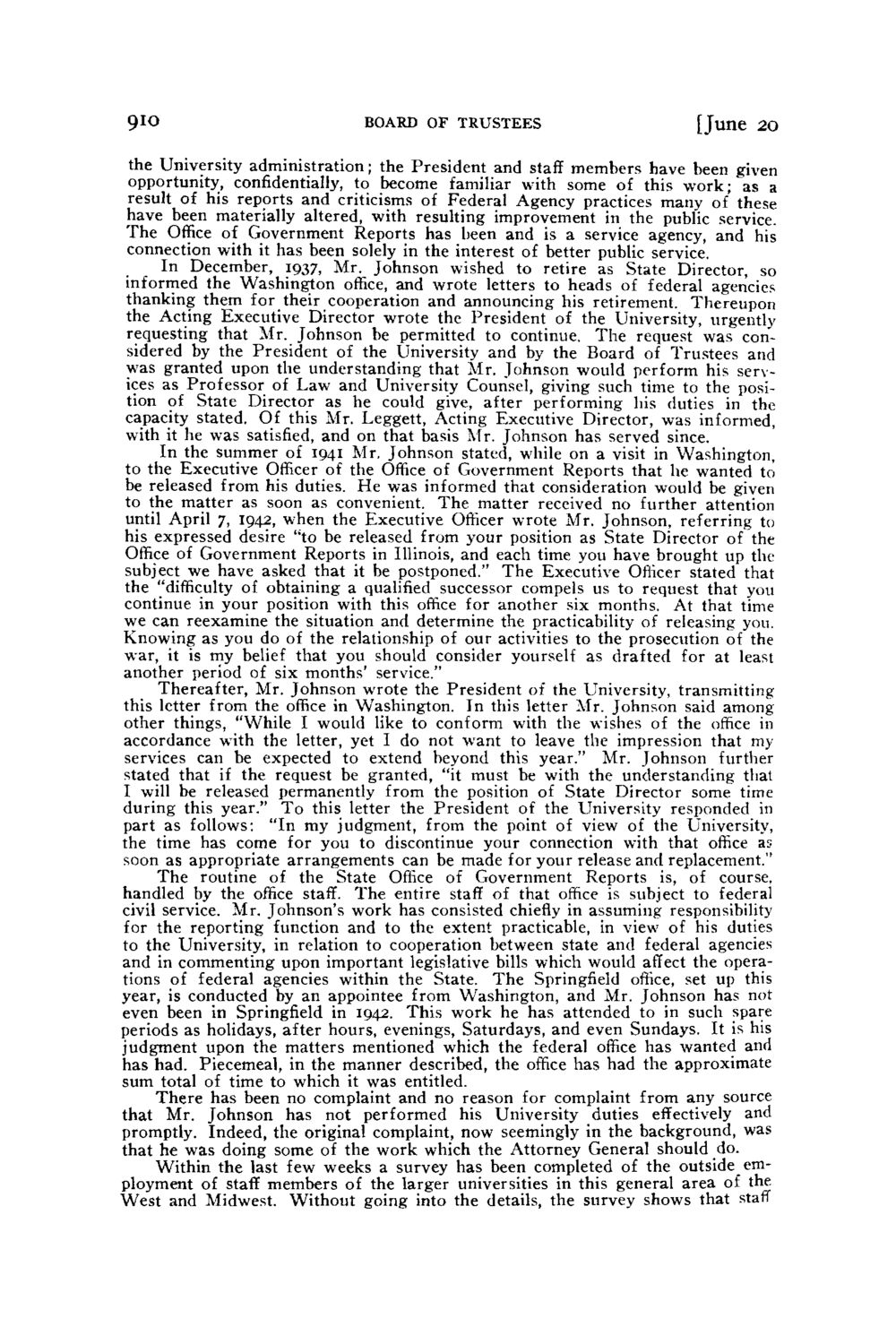| |
| |
Caption: Board of Trustees Minutes - 1942
This is a reduced-resolution page image for fast online browsing.

EXTRACTED TEXT FROM PAGE:
910 BOARD OF TRUSTEES [June 20 the University administration; the President and staff members have been given opportunity, confidentially, to become familiar with some of this w o r k ; as a result of his reports and criticisms of Federal Agency practices many of these have been materially altered, with resulting improvement in the public service. T h e Office of Government Reports has been and is a service agency, and his connection with it has been solely in the interest of better public service. In December, 1937, Mr. Johnson wished to retire as State Director, so informed the Washington office, and wrote letters to heads of federal agencies thanking them for their cooperation and announcing his retirement. Thereupon the Acting Executive Director wrote the President of the University, urgently requesting that Mr. Johnson be permitted to continue. T h e request was considered by the President of the University and by the Board of Trustees and was granted upon the understanding that Mr. Johnson would perform his services as Professor of Law and University Counsel, giving such time to the position of State Director as he could give, after performing his duties in the capacity stated. Of this Mr. Leggett, Acting Executive Director, was informed, with it he was satisfied, and on that basis Mr. Johnson has served since. In the summer of 1941 Mr. Johnson stated, while on a visit in Washington, to the Executive Officer of the Office of Government Reports that he wanted to be released from his duties. H e was informed that consideration would be given to the matter as soon as convenient. T h e matter received no further attention until April 7, 1942, when the Executive Officer wrote Mr. Johnson, referring to his expressed desire "to be released from your position as State Director of the Office of Government Reports in Illinois, and each time you have brought up the subject we have asked that it be postponed." T h e Executive Officer stated that the "difficulty of obtaining a qualified successor compels us to request that you continue in your position with this office for another six months. At that time we can reexamine the situation and determine the practicability of releasing you. Knowing as you do of the relationship of our activities to the prosecution of the war, it is my belief that you should consider yourself as drafted for at least another period of six months' service." Thereafter, Mr. Johnson wrote the President of the University, transmitting this letter from the office in Washington. In this letter Mr. Johnson said among other things, "While I would like to conform with the wishes of the office in accordance with the letter, yet I do not want to leave the impression that my services can be expected to extend beyond this year." Mr. Johnson further stated that if the request be granted, "it must be with the understanding that I will be released permanently from the position of State Director some time during this year." T o this letter the President of the University responded in part as follows: "In my judgment, from the point of view of the University, the time has come for you to discontinue your connection with that office as soon as appropriate arrangements can be made for your release and replacement." T h e routine of the State Office of Government Reports is, of course. handled by the office staff. T h e entire staff of that office is subject to federal civil service. Mr. Johnson's work has consisted chiefly in assuming responsibility for the reporting function and to the extent practicable, in view of his duties to the University, in relation to cooperation between state and federal agencies and in commenting upon important legislative bills which would affect the operations of federal agencies within the State. T h e Springfield office, set up this year, is conducted by an appointee from Washington, and Mr. Johnson has not even been in Springfield in 1942. This work he has attended to in such spare periods as holidays, after hours, evenings, Saturdays, and even Sundays. It is his judgment upon the matters mentioned which the federal office has wanted and has had. Piecemeal, in the manner described, the office has had the approximate sum total of time to which it was entitled. There has been no complaint and no reason for complaint from any source that Mr. Johnson has not performed his University duties effectively and promptly. Indeed, the original complaint, now seemingly in the background, was that he was doing some of the work which the Attorney General should do. Within the last few weeks a survey has been completed of the outside employment of staff members of the larger universities in this general area of the West and Midwest. Without going into the details, the survey shows that staff
| |